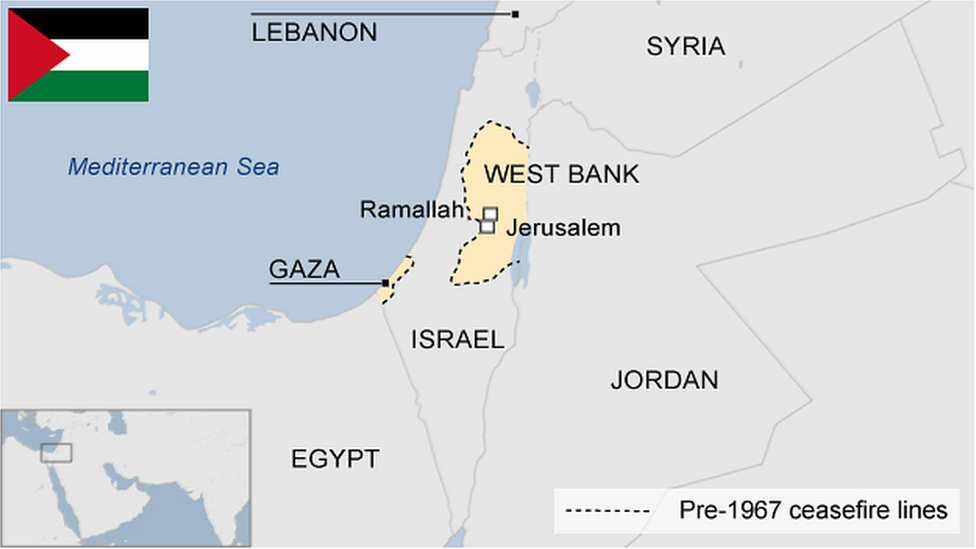Israel-Gaza fighting continues for second day after militant's death
- Published
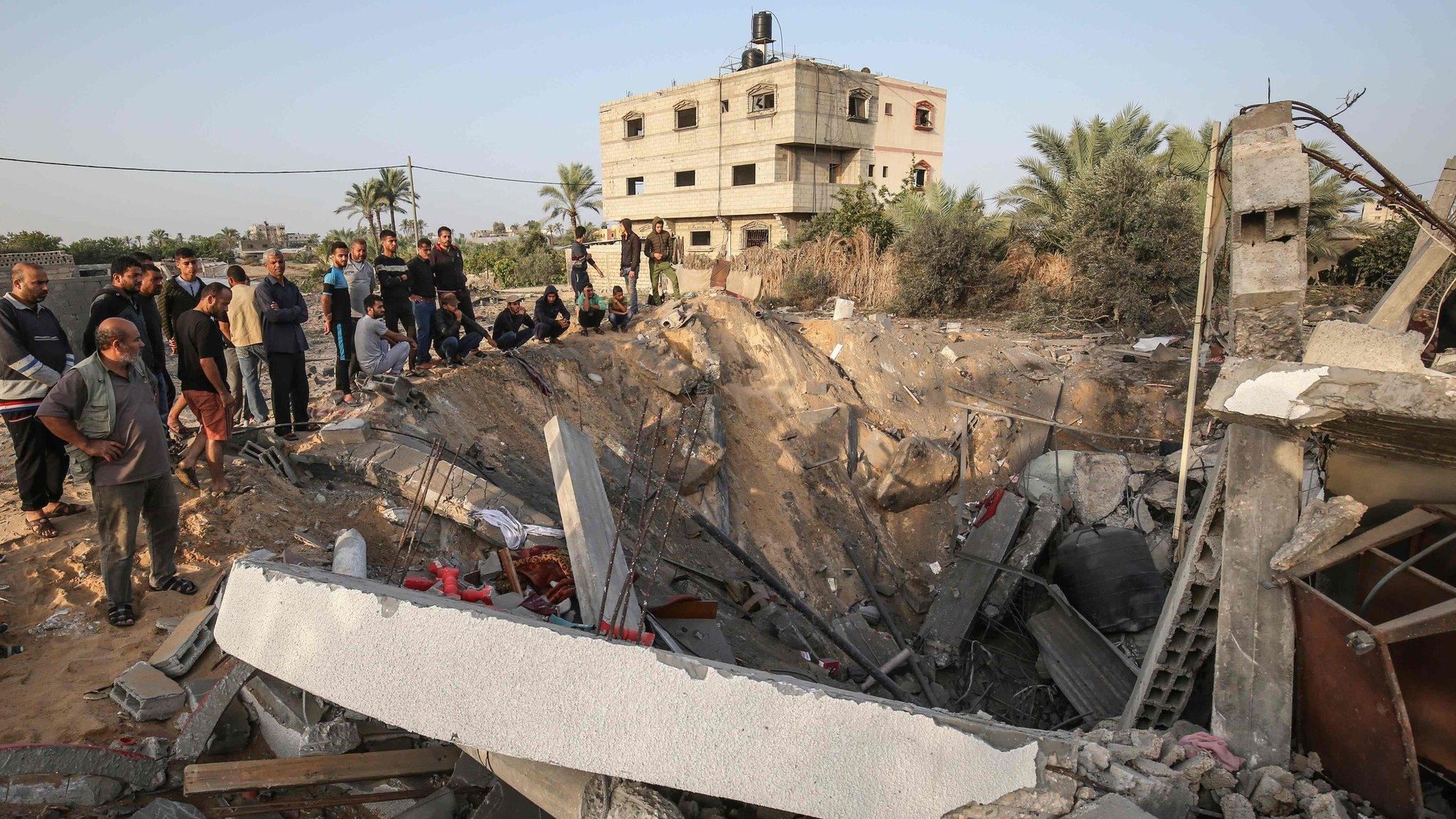
A destroyed house in Khan Younis, where Israel said it had hit a Palestinian Islamic Jihad HQ
Cross-border violence between Israel and militants in Gaza is continuing after an Israeli air strike killed a Palestinian Islamic Jihad commander.
After an overnight lull, rocket fire towards Israel resumed and Israeli aircraft conducted retaliatory strikes on Wednesday.
Gaza's Hamas-run health ministry said 32 Palestinians, including children, have been killed by Israeli fire.
In Israel, 63 people have been treated for injuries and stress symptoms.
Late on Wednesday, Palestinian Islamic Jihad (PIJ) offered terms for a ceasefire, which included an end to Israel's targeted killings of militants and Gaza border protesters and well as steps to ease the blockade of the Palestinian enclave.
Israel has so far made no public comments on the truce offer.
What is the latest?
After a six-hour pause, PIJ militants resumed firing rockets at around 06:30 (04:30 GMT) on Wednesday, triggering air-raid sirens in southern and central Israel.
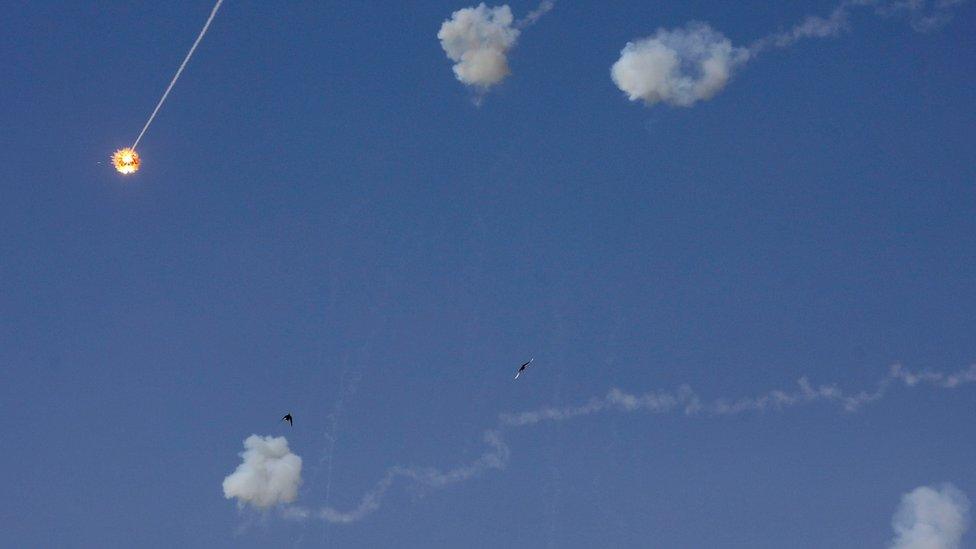
Most of the rockets fired by Palestinian militants have been intercepted by Israeli air defences
At least 360 rockets have been fired into Israel from Gaza since Tuesday, the Israeli army says. It adds that 90% of the missiles were intercepted.
An elderly woman was slightly wounded by broken glass after a rocket hit a house in the southern Israeli city of Ashkelon, Israeli media reported. Another rocket hit a factory in the southern town of Sderot.
The Israel Defense Forces (IDF) said it had bombed more PIJ targets in Gaza on Wednesday in response, including a military headquarters in Khan Younis and a factory manufacturing warheads for long-range rockets in the south of the strip.
The IDF said "20 terrorists" were killed, most of them from Islamic Jihad.
The health ministry in Gaza, which is run by Hamas militants, said 32 people had been killed in Israeli strikes, at least a third of them civilians.
It said six Palestinians from a single family were killed in a strike in the early hours of Thursday morning at their home in Deir al-Balah town, central Gaza Strip.
It was the deadliest incident reported since the beginning of the current fighting.
The Israeli military has not yet commented on the incident.
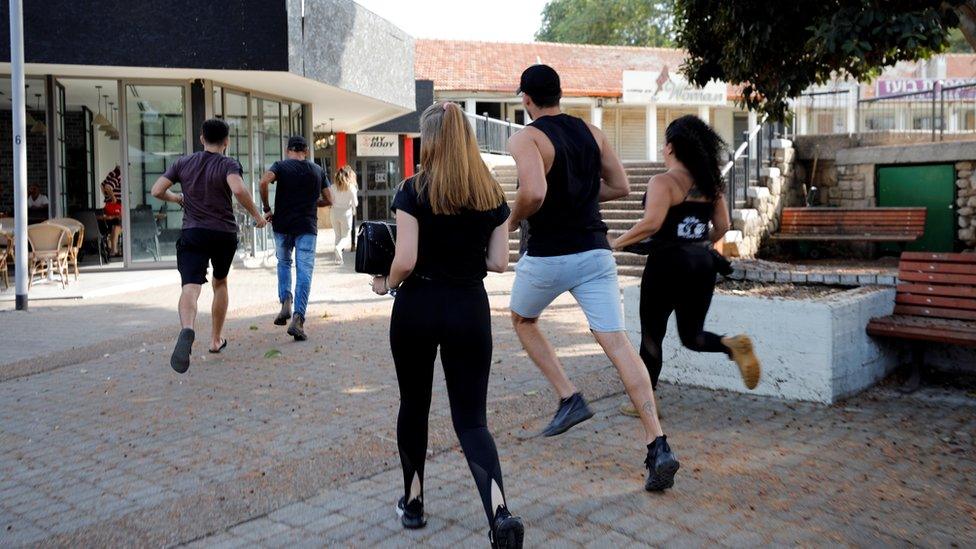
The rocket fire triggered air-raid sirens in southern and central Israel
PIJ said the dead included members of its military wing, the al-Quds Brigades. Khaled Faraj, a field commander, was killed in a strike in central Gaza.
UN Middle East peace envoy Nickolay Mladenov warned that the continuing escalation was "very dangerous".
"The indiscriminate launching of rockets and mortars against population centres is absolutely unacceptable and must stop immediately," he said. "There can be no justification for any attacks against civilians."
In a statement, Save the Children charity said it was "deeply concerned by the recently escalated hostilities",, external calling for an immediate ceasefire.
"For the second day, hundreds of thousands of children are impacted by school closures across Gaza and southern Israel, with parents terrified of the impact of further retaliation.
"Our teams in Gaza have been unable to go to work and our programmes have been suspended," the charity said.
What happened on Tuesday?
A pre-dawn Israeli air strike on a residential building in eastern Gaza City killed Baha Abu al-Ata, a senior PIJ military commander, and his wife.
At about the same time, the home of another leader of the Iran-backed group was struck by an Israeli missile in Damascus, killing two people, Syrian state media said. Israel did not comment on the incident.
Gaza militants retaliated with rocket fire - then Israel responded with further air strikes
Israel's Prime Minister, Benjamin Netanyahu, described Abu al-Ata as an "arch-terrorist" and a "ticking bomb" who posed an imminent threat to the country.
Abu al-Ata was thought to be behind recent rocket fire from Gaza, including an attack 10 days ago on Sderot, and to have acted increasingly outside of the control of the dominant militant faction Hamas.
Militants in Gaza said Israel had crossed a "red line" and fired more than 200 rockets in response.
About 90% of the rockets were intercepted by Iron Dome air defence systems, the IDF said, but one exploded on a main road close to passing cars, and elsewhere two people were lightly injured by shrapnel. An eight-year-old girl also suffered a heart attack in a bomb shelter and remains in a serious condition.

The IDF said it carried out air strikes in Gaza targeting PIJ rocket-launching units and infrastructure. Gaza's health ministry said eight people were killed, in addition to Abu al-Ata and his wife.
What are both sides saying?
PIJ spokesman Musab al-Buraim told the Hamas-linked Shehab news agency that it was not "appropriate" to discuss Egyptian efforts to end the flare-up when the group was still retaliating for Abu al-Ata's death.
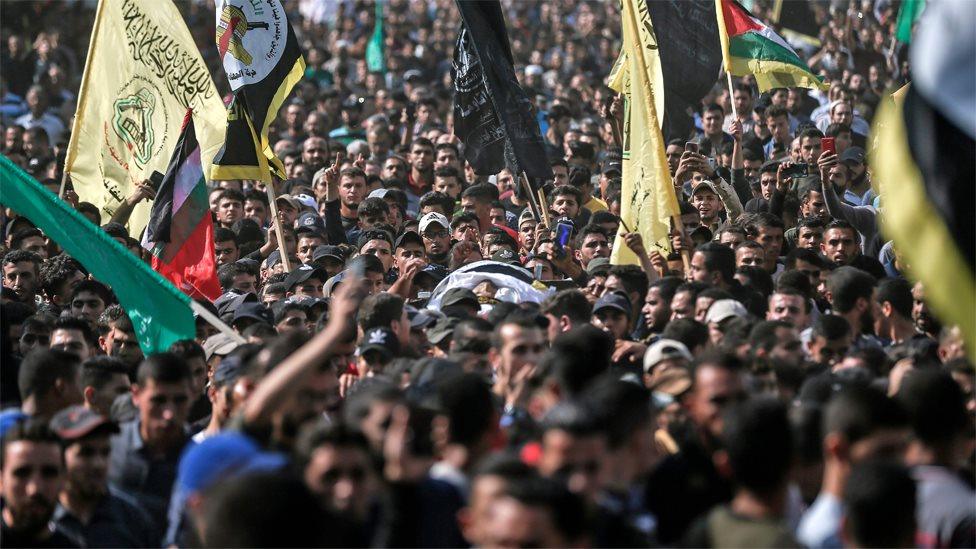
Palestinian Islamic Jihad has vowed to avenge the death of Baha Abu al-Ata
"When we complete the response, it is possible to discuss calm," he said.
At the start of a special cabinet meeting on Wednesday, Mr Netanyahu warned PIJ that if it did not halt the rocket fire Israel would continue to hit Gaza.
"They have but one choice: either stop these attacks or absorb more and more blows," he said.
Earlier, IDF spokesman Brig Gen Hidai Zilberman told Israeli media that additional Iron Dome batteries had been deployed to central Israel as a precaution, and that commando units had been sent to communities near the Gaza border to defend them in case of infiltration attacks by militants.
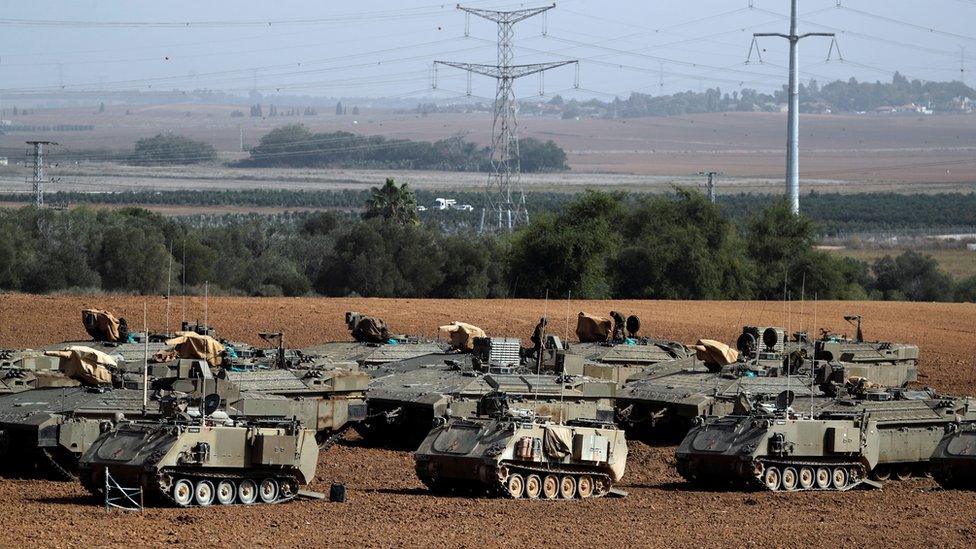
Israel's military said it had moved reinforcements to communities near the Gaza border
There has been no sign yet that Hamas, which controls Gaza, intends to join the fight. If it does, the conflict would escalate sharply, says the BBC's Barbara Plett Usher in Jerusalem.
In order to prevent that, Israeli officials have signalled they are targeting only PIJ, and not Hamas. Gen Zilberman said the IDF was "walking on a tight-rope".
Our correspondent says it is the first time that Israeli officials are drawing a distinction between the two groups during a cross border flare-up - normally they hold Hamas responsible for any violence from Gaza.
The IDF said on Tuesday that Baha Abu al-Ata had undermined recent efforts to broker a ceasefire between Israel and Hamas.
- Published16 January
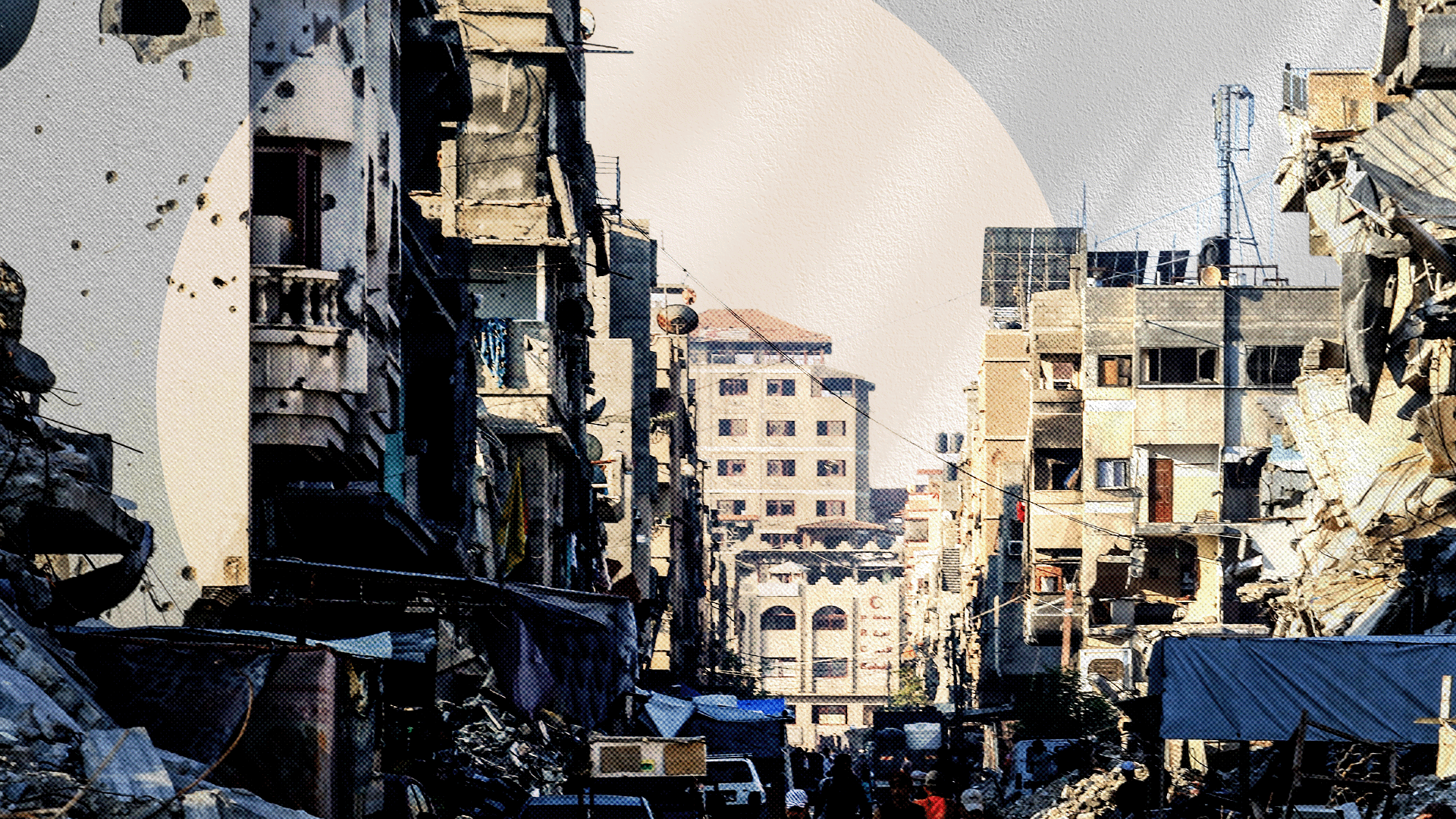
- Published24 June 2019
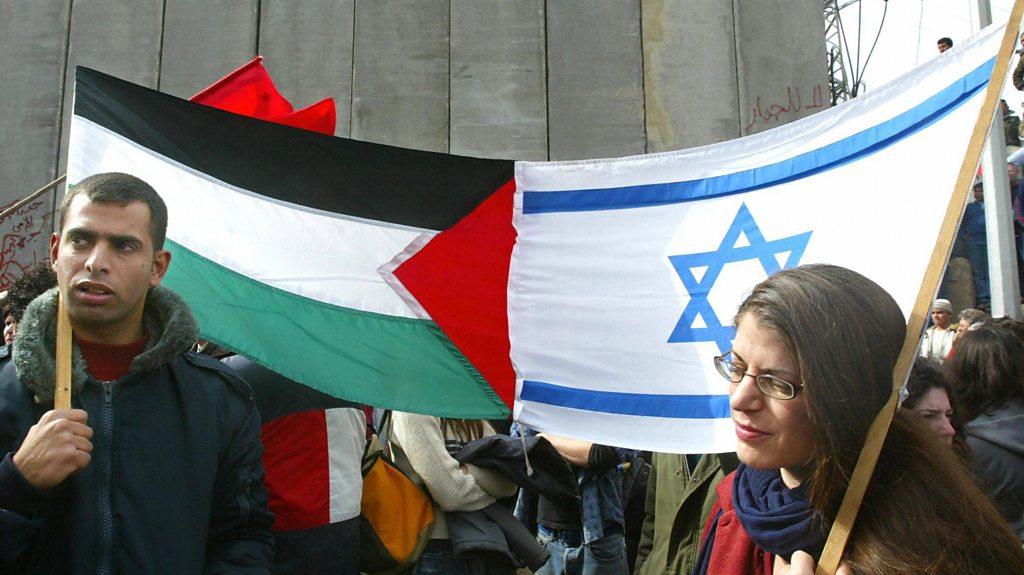
- Published26 June 2023
